In order to complement and drive growth beyond its extensive traditional licensing programs, Marvel Entertainment has established an innovative strategy of brand extensions for its superhero portfolio with various non-traditiona
April 6, 2018

In order to complement and drive growth beyond its extensive traditional licensing programs, Marvel Entertainment has established an innovative strategy of brand extensions for its superhero portfolio with various non-traditional partnerships, products and retail channels.
Marvel's focus on co-branding has resulted in several mega deals that positions the licensor's iconic properties alongside other well-known brands, garnering exposure to various new consumers that might not otherwise be part of Marvel's superhero fan base.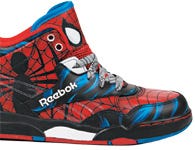
"Several years ago we developed a growth strategy to pursue new demographic segments and extend the reach of the Marvel brand into new distribution channels," explains Paul Gitter, president of consumer products, North America, Marvel Entertainment, a wholly owned subsidiary of Walt Disney Company and the world's sixth largest global licensor with $5.6 billion in retail sales of licensed merchandise. "We began to evaluate various co-branding opportunities that would give us strong credibility in the specialty retail channel, access to the sporting goods channel and the ability to penetrate local retailers and communities nationwide." 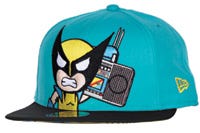
Marvel now boasts a roster of co-branding partnerships including Stussy x Marvel, tokidoki x Marvel, National Basketball Association, NYC & Company, Monster Jam, Harley Davidson and Marvel vs. Capcom, with several more deals in the development stages.
The co-branding strategy began with Reebok, which, according to Gitter, enabled "Marvel to reach a different consumer and penetrate the vertical specialty stores such as Finish Line and Foot Locker to give us instant credibility." 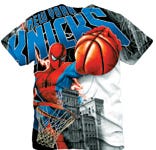
This summer Marvel is launching an expanded program with Reebok that will include Captain America, Spider-Man and The Avengers and will feature a more retro style that is very different than the mass products. The new program also includes apparel, which Gitter says allows the licensor to make a more impactful and visible brand statement. 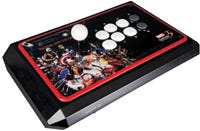
Marvel's most recent co-branding deal announced in April brings together its superheroes with the city of New York. The partnership with NYC & Company will include merchandise featuring Marvel's characters along with the NYPD, FDNY, New York City Taxi and Limousine Commission and the Department of Sanitation. Products will cut across consumers and categories from onesies to retro art, as well as apparel and hard lines with mugs, picture frames and other souvenir merchandise. The program will include t-shirts from JEM, hats and bags from Bioworld and accessories by Silver Buffalo. Products debuted at Toys 'R' Us Times Square. According to Marvel, a significant portion of the proceeds from the sale of these products will benefit the New York City Police Foundation and the FDNY Foundation.
"This is a very localized deal that will enable Marvel to gain distribution in 'mom and pop' retailers, souvenir shops and airport stores," explains Gitter. "We hope to expand into other cities including Los Angeles, Las Vegas, Miami and Chicago." 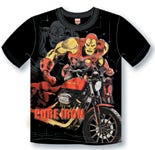
Marvel's co-branding partnership with the NBA is another example that executes Gitter's strategy of reaching new audiences.
"The NBA deal leverages the strong similarity of people that enjoy sports, going to movies and buying collectables," explains Gitter. "We now have distribution in sports arenas, stadiums, and specialty retailers."
The program, which featured Spider-Man, Iron Man and Captain America with NBA team logos and colors, was launched in February with 10 NBA teams including the New York Knicks and Los Angeles Lakers. Products were sold in teams' respective arenas–Madison Square Garden and Staples Center–as well as specialty sporting goods retailers including Modell's and Lid's. Test programs were implemented in Walmart, JCPenney and other traditional retailers. Gitter says a full sale rollout is planned for the 2011-2012 season. 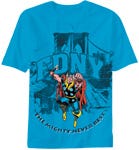
Two other co-branding deals bring Marvel into the high-end specialty retail sector: • The Stussy x Marvel Project–Series One of The Stussy x Marvel Project, which is a collaboration with the House of Ideas and Marvel Entertainment, debuted in April on the high-end retailer's website and in its chapter stores, in addition to other selected retailers. The collection of co-branded apparel includes nine designs featuring superheroes such as Captain America, Dr. Doom, Punisher, Wolverine, Doc Ock, Ghost Rider and Silver Surfer mixed with Stussy's iconic graphic language. Series Two of The Stussy x Marvel Project was released last month, featuring nine guest artists interpreting their favorite characters from the Marvel Universe. Each purchase included a limited edition pack of Stussy x Marvel trading cards. • tokidoki x Marvel–tokidoki, founded by designer Simone Legno, re-interprets Marvel's brands with a fresh and innovative design. The more than 40 skus include products such as skateboards, T-shirts, hoodies and hats.
Other co-branding partnerships that give Marvel exposure to new audiences include: • Monster Jam–Marvel's deal with the Feld Motor Sports features die-cast replicas from Mattel as well as trading cards, posters and calendars. • Marvel vs. Capcom–Based on characters from the latest video game, Marvel created a merchandising program that includes apparel from Mad Engine and Philcos Enterpriser, figurines from Diamond Select Toys and Collectables, high-end statues from Hollywood Collectables Group and an art book from UDON. • Harley-Davidson–Marvel partnered with the motorcycle manufacturer and SGI Apparel to launch a collection of co-branded merchandise including apparel and accessories for newborns, infants, toddlers, boys and girls. 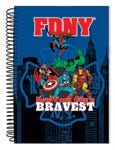
Marvel has been successful with its co-branding efforts and the strategy will continue to be a key part of its future as well.
"We will continue to look at co-branding and how we can reach new customer segments in a way that is relevant," says Gitter. "We will identify retailers that have not traditionally looked at entertainment licensing as a viable strategy and offer them a whole new way to bring our properties to market."
You May Also Like






